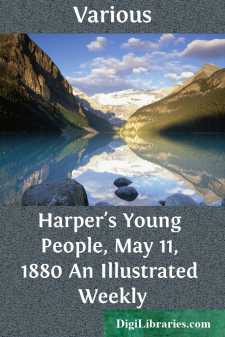Categories
- Antiques & Collectibles 13
- Architecture 36
- Art 48
- Bibles 22
- Biography & Autobiography 815
- Body, Mind & Spirit 144
- Business & Economics 28
- Children's Books 18
- Children's Fiction 14
- Computers 4
- Cooking 94
- Crafts & Hobbies 4
- Drama 346
- Education 58
- Family & Relationships 59
- Fiction 11835
- Games 19
- Gardening 17
- Health & Fitness 34
- History 1378
- House & Home 1
- Humor 147
- Juvenile Fiction 1873
- Juvenile Nonfiction 202
- Language Arts & Disciplines 89
- Law 16
- Literary Collections 686
- Literary Criticism 179
- Mathematics 13
- Medical 41
- Music 40
- Nature 180
- Non-Classifiable 1768
- Performing Arts 7
- Periodicals 1453
- Philosophy 65
- Photography 2
- Poetry 896
- Political Science 203
- Psychology 44
- Reference 154
- Religion 515
- Science 126
- Self-Help 85
- Social Science 83
- Sports & Recreation 34
- Study Aids 3
- Technology & Engineering 59
- Transportation 23
- Travel 463
- True Crime 29
Our website is made possible by displaying online advertisements to our visitors.
Please consider supporting us by disabling your ad blocker.
Harper's Young People, May 11, 1880 An Illustrated Weekly
by: Various
Categories:
Description:
Excerpt
Although in the remote and dreary ice regions of the extreme North a variety of game, including bear, whale, walrus, seal, reindeer, foxes, wolves, ptarmigan, ducks, and geese, is found and pursued by the hardy Esquimau, or Innuit, it is upon the capture of the seal that he expends the most time and labor. The seal is everything to him, and without it life could hardly be sustained. In the words of Captain Hall: "To the Innuit the seal is all that flocks and herds, grain fields, forests, coal mines, and petroleum wells are to dwellers in more favored lands. It furnishes him with food, fuel, and clothing."
"Nutchook" (the seal) is one of the most wary and suspicious of animals, and to capture him when he is on his guard requires an almost incredible amount of skill and perseverance. The Innuits say that "Ninoo" (the bear) taught them to capture the seal, and that if they could talk to Nutchook as cleverly as Ninoo does, they would capture him much oftener than they do. When Ninoo sees, at a distance upon the ice, a black spot that he knows to be Nutchook taking a nap beside his air-hole, he makes up his mind that he will dine that day off seal.
Nutchook's nap is a series of "cat-naps," each lasting about ten seconds, and after each he lifts his head and looks around. Ninoo crouches low upon the ice, and creeps along when the seal is napping. The moment his head is raised, the bear stops short and begins to talk to Nutchook. The sound that he utters while thus talking is quite different from his ordinary voice, and seems to charm the seal, who lays his head down for another nap, during which Ninoo again advances. At last the bear is within springing distance, and in a moment all is over with poor Nutchook.
Although seals are caught at all seasons of the year, the great hunts take place in the spring and early summer months. At this time the fur is in the best possible condition, and as they play in the open water lanes near the coast, or bask in great numbers on the ice, their capture is comparatively easy. During the summer the glare of the sun so affects the eyes of the seal that he becomes almost blind, and is easily approached.
Hundreds of vessels, many of them steamers, are engaged in the seal fishery, and on the first page of this number is a picture of the boats belonging to one of these "sealers" drifting cautiously down upon a number of seals that have been basking and frolicking on the ice, heedless of the approach of danger. Hundreds of thousands of seals are thus killed every year for the sake of their skins, which are shipped to every part of the world, and from which are made the beautiful sacques, muffs, tippets, and gloves with which most of our readers are so familiar. Only last month a disaster occurred that vividly illustrates the danger of sealing. A huge ice-field a hundred miles long, and bringing with it thousands of seals, drifted down from the North, and stranded on the coast of Newfoundland near St. Johns. For several days the people living along the coast ventured far out on the ice, and captured great numbers of the seals.
Suddenly, on the 4th of April, the northeast wind that had been blowing steadily for two weeks, and keeping the ice packed, changed to a warm southerly breeze. The ice-pack broke, became intersected in every direction by lanes of water, and began to drift out to sea, carrying with it more than two hundred of the hardy hunters. Many of these were rescued by steamers, but others were borne away into the fog, beyond the hope of rescue, far out to sea, where they have perished from starvation, freezing, or drowning....












